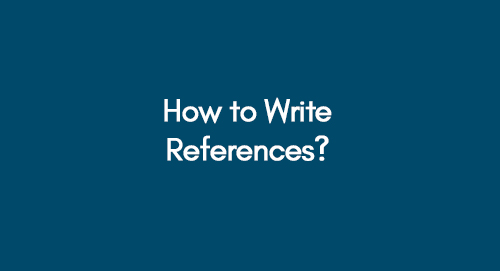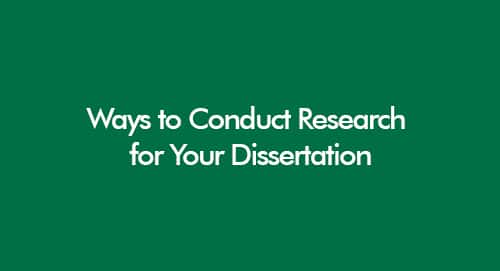
How to Write Recommendations: Do’s and Don’ts.
October 26, 2022
How to Write Email to a Teacher: The Impact of Positive Teacher-Student Connections
October 26, 2022In the academic community, it is widely accepted that every new research builds on previous findings and knowledge. This means that even if a study is conducted in a new field, related research or studies must have been conducted previously, influencing and informing the new research. To acknowledge and give credit to these previous works, authors of peer-reviewed articles are required to provide proper citations and references.
Check Current Dissertation Topics
Explore Complete Dissertation Examples
In the following sections, you will learn how to cite references quickly and accurately:
Difference Between References and Citations
References and citations generally serve the same purpose, but there are the following differences between the two categories:
References are a list of sources that are consulted or cited in a research paper, thesis, or dissertation. They provide the reader with the details of the source material used in the research, for instance, the author's name, publication date, title, and publishing information. A reference list usually appears at the end of the paper, and each entry is typically organized in alphabetical order according to the author's last name.
Learn More about an Expert Guide to Writing Dissertation References
Citations, on the other hand, are brief mentions of the sources used in the text of the research paper. Citations can take different forms depending on the citation style but generally include the author's name and the source's publication date. Citations allow the reader to locate the full source of the information cited and help to establish the credibility of the author's argument.
General Guidelines for Citing Sources
Writing a reference list is an essential part of academic writing. It shows the sources you have used in your research and gives credit to the original authors. Here are some tips on how to write a reference list correctly:
- Use the Correct Format: Different citation styles require different formats for references. The most commonly used styles are APA, MLA, Harvard and Chicago. Check with your supervisor or consult a style guide to ensure you are using the correct format.
- Include All the Necessary Information: Each reference should include the author's name, the title of the work, the publication date, the publisher, and the page numbers. Make sure you include all the necessary information for each source.
- Alphabetize Your References: Arrange your references in alphabetical order based on the author's last name. If there is no author, use the title of the work instead.
- Use Italics or Underlining: Use italics or underlining to indicate the titles of books, journals, or magazines. If you are using APA style, use italics. If you are using MLA or Chicago style, use underlining.
- Use Proper Punctuation: Use proper punctuation when writing references. For example, use a comma in APA style between the author's name and the publication date. In MLA style, you can use a period.
- Check Your References for Accuracy: Double-check your references to ensure that they are accurate and complete. Incorrect or incomplete references can affect the credibility of your work.
- Use Online Tools: Many online tools can help you create accurate and properly formatted references. Some popular tools include RefWorks, EndNote, and Zotero.
Master Your Dissertation or Thesis References
A well-written reference list is an important part of academic writing. By following the tips above, you can ensure that your references are accurate, complete, and properly formatted. Remember, a well-cited paper shows that you have done your research and have given credit to the original authors.
What are DOI and URL?
When referencing and citing online sources, you should know the differences between DOI and URL to locate online resources. The following explanation will help in understanding DOI and URL:
DOI
DOI is an abbreviation for digital object identifier. It is a sequence of numbers, symbols or letters to identify a document, including articles or pages, and links it to the web. Journals have a DOI for each article published online, and it is essential to use them in reference lists, especially if they aren’t published in print.
- A DOI is frequently used to identify a journal article but is also included in other publishing formats, such as books.
- Every DOI begins with 10. and consists of both numbers and letters.
- The DOI gives the object a permanent internet address, making it simple to find.
- To find papers, use Library Search's DOI number search function.
- Use the DOI in your reference list item wherever possible (for print or online content).
- There isn't a full stop after a DOI.
Learn Harvard Referencing Style in a Quick Way
URL
A URL is a short form of a Uniform Resource Locator. It is essentially an address of a document on the web and is unique. You can use URLs in your references according to the norms of the used referencing style.
- Include a URL in your reference if an online journal article or e-book doesn't have a DOI.
- Consider the journal's homepage URL when referencing journal articles without a DOI.
- To discover the journal's webpage, you might search for the journal name (inside double quotation marks).
- Alternatively, you can search the Ulrich web database of the library for the journal record using the journal's title or ISSN. Locate the journal URL for your use on the journal record page.
You must provide the URL of the system homepage in your reference if you utilize any electronic materials from a library database that don't have a DOI, such as an eBook, a data collection, or a journal without a website.
Different Styles of Referencing
There are different styles of references and citations, each one with its distinctive guidelines. The following list contains some of the most commonly used reference and citation styles:
AMS (American Meteorological Society): The American Mathematical Society's citation standards are referred to as AMS Style. The order in which the citation is referenced in the paper's text is indicated by the # symbol in brackets when using AMS.
APA (American Psychological Association): APA is a modification of the Harvard style. Most standards are the same, with concise author-date citations in brackets in the main text and complete citations in the reference list. In APA style, offering a reference list instead of a bibliography is normal. There is no requirement to mention an access or retrieval date for website references unless the page content is expected to change over time.
MLA (Modern Languages Association): The MLA style uses a parenthetical citation format, so references in brackets in your essay's body are connected to total citations in the bibliography at the conclusion. The only information in the essay's main body bracket is the author's last name and the page number or numbers you are citing. For instance, several distinct reference practices or standards exist, but four are the most common. A bibliography constructed in accordance with MLA guidelines arranges the references according to the author's last name. Each item should have the following information in this order: the complete name of the author, the book/publication's title, the publishing location, the publisher, and the date.
Chicago: The Chicago citation style has two versions - the Notes and Bibliography style and the Author-Date style. It is commonly used in history, arts, and social sciences. In the Notes and Bibliography style, citations appear in footnotes or endnotes, while the Author-Date style uses parenthetical citations.
Harvard: Referred to as the "author-date" style, the in-text referencing in Harvard style utilizes the author's last name, the publication's date and the page number if it refers to a specific page. It can be placed in brackets in the main body or footnotes. Only the bibliography or reference list contains complete information.
The recommended punctuation and format of the text may vary, and your University can have its preferred method because Harvard is a "style" rather than a system or set of standards.
Oxford: In-text citations in Oxford referencing are in the footnotes. Complete information should be included in the footnotes for the initial mention of a text. A condensed version can then be utilized.
Vancouver: Each source is assigned a number according to its position in the text in the numeric referencing method known as Vancouver referencing. The same number is used each time the same source is cited in the text. A single, numbered list of citations with complete information makes up the reference list. You can also add a supplementary bibliography, alphabetized by author, including any sources you utilized for your assignment's research but did not credit in the text.
OSCOLA: Oxford Standard for the Citation of Legal Authorities is abbreviated to OSCOLA. The School of Law at Reading prefers it because it contains guidelines for handling the sources that legal scholars regularly use, such as court decisions, legislation, and directives. Footnotes are used for in-text citations, and formal abbreviations are used for important sources, such as AC for Appeal Cases. Minimum punctuation and precise guidelines for handling consecutive references are used.
MHRA: A number in the text that refers to a footnote or endnote is generally employed in the MHRA (Modern Humanities Research Association) style (this is the version used by English Literature). You can utilize name-year in-text citations. The whole bibliography is listed alphabetically by the first author's last name.
Get Full Research Guidelines Here
Conclusion
Referencing styles are vital in academic writing, providing a standardized way to acknowledge and credit sources. They enhance credibility, facilitate research replication, and demonstrate academic integrity. Whether it's APA, MLA, Chicago, or another style, adherence to a specific referencing style ensures accuracy, consistency, and professionalism in citing and referencing sources. Mastering referencing styles is essential for effective communication and upholding the standards of academic scholarship.
The referencing styles govern how to write references in a research paper or dissertation. We have covered the basics of each referencing style; if you need help to understand each style in more detail, contact us for a consultation session.
Get 3+ Free Dissertation Topics within 24 hours?
In the academic community, it is widely accepted that every new research builds on previous findings and knowledge. This means that even if a study is conducted in a new field, related research or studies must have been conducted previously, influencing and informing the new research. To acknowledge and give credit to these previous works, authors of peer-reviewed articles are required to provide proper citations and references.
Check Current Dissertation Topics
Explore Complete Dissertation Examples
In the following sections, you will learn how to cite references quickly and accurately:
Difference Between References and Citations
References and citations generally serve the same purpose, but there are the following differences between the two categories:
References are a list of sources that are consulted or cited in a research paper, thesis, or dissertation. They provide the reader with the details of the source material used in the research, for instance, the author's name, publication date, title, and publishing information. A reference list usually appears at the end of the paper, and each entry is typically organized in alphabetical order according to the author's last name.
Learn More about an Expert Guide to Writing Dissertation References
Citations, on the other hand, are brief mentions of the sources used in the text of the research paper. Citations can take different forms depending on the citation style but generally include the author's name and the source's publication date. Citations allow the reader to locate the full source of the information cited and help to establish the credibility of the author's argument.
General Guidelines for Citing Sources
Writing a reference list is an essential part of academic writing. It shows the sources you have used in your research and gives credit to the original authors. Here are some tips on how to write a reference list correctly:
- Use the Correct Format: Different citation styles require different formats for references. The most commonly used styles are APA, MLA, Harvard and Chicago. Check with your supervisor or consult a style guide to ensure you are using the correct format.
- Include All the Necessary Information: Each reference should include the author's name, the title of the work, the publication date, the publisher, and the page numbers. Make sure you include all the necessary information for each source.
- Alphabetize Your References: Arrange your references in alphabetical order based on the author's last name. If there is no author, use the title of the work instead.
- Use Italics or Underlining: Use italics or underlining to indicate the titles of books, journals, or magazines. If you are using APA style, use italics. If you are using MLA or Chicago style, use underlining.
- Use Proper Punctuation: Use proper punctuation when writing references. For example, use a comma in APA style between the author's name and the publication date. In MLA style, you can use a period.
- Check Your References for Accuracy: Double-check your references to ensure that they are accurate and complete. Incorrect or incomplete references can affect the credibility of your work.
- Use Online Tools: Many online tools can help you create accurate and properly formatted references. Some popular tools include RefWorks, EndNote, and Zotero.
Master Your Dissertation or Thesis References
A well-written reference list is an important part of academic writing. By following the tips above, you can ensure that your references are accurate, complete, and properly formatted. Remember, a well-cited paper shows that you have done your research and have given credit to the original authors.
What are DOI and URL?
When referencing and citing online sources, you should know the differences between DOI and URL to locate online resources. The following explanation will help in understanding DOI and URL:
DOI
DOI is an abbreviation for digital object identifier. It is a sequence of numbers, symbols or letters to identify a document, including articles or pages, and links it to the web. Journals have a DOI for each article published online, and it is essential to use them in reference lists, especially if they aren’t published in print.
- A DOI is frequently used to identify a journal article but is also included in other publishing formats, such as books.
- Every DOI begins with 10. and consists of both numbers and letters.
- The DOI gives the object a permanent internet address, making it simple to find.
- To find papers, use Library Search's DOI number search function.
- Use the DOI in your reference list item wherever possible (for print or online content).
- There isn't a full stop after a DOI.
Learn Harvard Referencing Style in a Quick Way
URL
A URL is a short form of a Uniform Resource Locator. It is essentially an address of a document on the web and is unique. You can use URLs in your references according to the norms of the used referencing style.
- Include a URL in your reference if an online journal article or e-book doesn't have a DOI.
- Consider the journal's homepage URL when referencing journal articles without a DOI.
- To discover the journal's webpage, you might search for the journal name (inside double quotation marks).
- Alternatively, you can search the Ulrich web database of the library for the journal record using the journal's title or ISSN. Locate the journal URL for your use on the journal record page.
You must provide the URL of the system homepage in your reference if you utilize any electronic materials from a library database that don't have a DOI, such as an eBook, a data collection, or a journal without a website.
Different Styles of Referencing
There are different styles of references and citations, each one with its distinctive guidelines. The following list contains some of the most commonly used reference and citation styles:
AMS (American Meteorological Society): The American Mathematical Society's citation standards are referred to as AMS Style. The order in which the citation is referenced in the paper's text is indicated by the # symbol in brackets when using AMS.
APA (American Psychological Association): APA is a modification of the Harvard style. Most standards are the same, with concise author-date citations in brackets in the main text and complete citations in the reference list. In APA style, offering a reference list instead of a bibliography is normal. There is no requirement to mention an access or retrieval date for website references unless the page content is expected to change over time.
MLA (Modern Languages Association): The MLA style uses a parenthetical citation format, so references in brackets in your essay's body are connected to total citations in the bibliography at the conclusion. The only information in the essay's main body bracket is the author's last name and the page number or numbers you are citing. For instance, several distinct reference practices or standards exist, but four are the most common. A bibliography constructed in accordance with MLA guidelines arranges the references according to the author's last name. Each item should have the following information in this order: the complete name of the author, the book/publication's title, the publishing location, the publisher, and the date.
Chicago: The Chicago citation style has two versions - the Notes and Bibliography style and the Author-Date style. It is commonly used in history, arts, and social sciences. In the Notes and Bibliography style, citations appear in footnotes or endnotes, while the Author-Date style uses parenthetical citations.
Harvard: Referred to as the "author-date" style, the in-text referencing in Harvard style utilizes the author's last name, the publication's date and the page number if it refers to a specific page. It can be placed in brackets in the main body or footnotes. Only the bibliography or reference list contains complete information.
The recommended punctuation and format of the text may vary, and your University can have its preferred method because Harvard is a "style" rather than a system or set of standards.
Oxford: In-text citations in Oxford referencing are in the footnotes. Complete information should be included in the footnotes for the initial mention of a text. A condensed version can then be utilized.
Vancouver: Each source is assigned a number according to its position in the text in the numeric referencing method known as Vancouver referencing. The same number is used each time the same source is cited in the text. A single, numbered list of citations with complete information makes up the reference list. You can also add a supplementary bibliography, alphabetized by author, including any sources you utilized for your assignment's research but did not credit in the text.
OSCOLA: Oxford Standard for the Citation of Legal Authorities is abbreviated to OSCOLA. The School of Law at Reading prefers it because it contains guidelines for handling the sources that legal scholars regularly use, such as court decisions, legislation, and directives. Footnotes are used for in-text citations, and formal abbreviations are used for important sources, such as AC for Appeal Cases. Minimum punctuation and precise guidelines for handling consecutive references are used.
MHRA: A number in the text that refers to a footnote or endnote is generally employed in the MHRA (Modern Humanities Research Association) style (this is the version used by English Literature). You can utilize name-year in-text citations. The whole bibliography is listed alphabetically by the first author's last name.
Get Full Research Guidelines Here
Conclusion
Referencing styles are vital in academic writing, providing a standardized way to acknowledge and credit sources. They enhance credibility, facilitate research replication, and demonstrate academic integrity. Whether it's APA, MLA, Chicago, or another style, adherence to a specific referencing style ensures accuracy, consistency, and professionalism in citing and referencing sources. Mastering referencing styles is essential for effective communication and upholding the standards of academic scholarship.
The referencing styles govern how to write references in a research paper or dissertation. We have covered the basics of each referencing style; if you need help to understand each style in more detail, contact us for a consultation session.
Get 3+ Free Dissertation Topics within 24 hours?

























